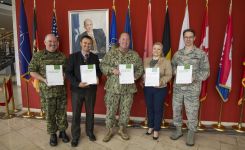- Partnership for Peace Consortium of Defense Aca...
- Working groups meet to discuss integrating gend...
Working groups meet to discuss integrating gender in teaching and content

OBERAMMERGAU, Germany -- Integrating gender in teaching and content was the topic of a recent NATO workshop.
About 25 participants from 14 countries participated in the workshop titled, "Teaching Gender to the Military: In the Classroom and Through Advanced Distributed Learning," July 17-20 held at the NATO School in Oberammergau.
"It is critical to build both institutional and individual expertise when dealing with gender in the classroom and how to teach it, how to maintain gender neutrality, how to bridge the gap between culture and gender, gender relations, gender identity, among others," said Dr. Kathaleen Reid-Martinez. "We need to ensure a gender-consultative environment and to avoid common pitfalls such as cultural stereotypes and ensure a multinational approach is considered, as well as audience composition. 'How' to teach it is part of the foundation of teaching gender to the military at all levels and in a variety of different cultures at all levels: strategic, operational and tactical levels." Reid-Martinez is co-chair of the consortium's Education and Development Working Group.
Bridging the gap between culture and gender, gender in the classroom, gender identity and gender relations and how to build gender into both institutional and individual levels of expertise, among other highlights remained salient topics throughout the conference. Strenthening military cultures interoperability with gender and enhancing gender diversity and its advantages in the strategic, operational and tactical arenas were key areas as well.
The interactive conference brought together three of the consortium's working groups: Security Sector Reform, Education and Development, and Advanced Distributed Learning. The conference targeted issues related to teaching and "mainstreaming" gender in a military environment at various levels as well as in multi-national settings. Understanding gender, the importance of teaching gender to the military and developing effective methods to teach it were main strategic areas of interest.
"The conference has helped us to better understand the importance of teaching gender to the military and to identify effective methods to teach it," said Anja Ebonether, chairperson of the consortium's Security Sector Reform Working Group, and head of special programs, assistant director, Democratic Control of the Armed Forces.
The conference was co-sponsored by the Partnership for Peace Consortium of Defense Academies and Security Studies Institutes and the Democratic Control of Armed Forces, a Geneva-based international research foundation.
In this image: "Dr. Kathaleen Reid-Martinez, U. S. co-chair of the PfPC Education and Development Working Group, discusses the evaluation of gender education and institutional structures to support gender education with Ukrainian Dr. Iryna Lysychkina, and Canadian Lt. Col. Ian Matehson, standards and development training officer, Peace Support Training Center, in a conference hosted at the NATO Schoolhouse, Oberammergau, Germany, July 17-20, at the 16th meeting of the Security Sector Reform Working Group in collaboration with the Education Development Working Group of the PfP Consortium of Defense Academies and Security Studies Institutes. The theme of the workshop was "Teaching Gender to the Military - in the Classroom and through Advanced Distributed Learning."

